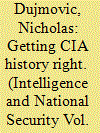|
|
|
Sort Order |
|
|
|
Items / Page
|
|
|
|
|
|
|
| Srl | Item |
| 1 |
ID:
116789


|
|
|
|
|
| Publication |
2012.
|
| Summary/Abstract |
This paper describes the origins of the covert paramilitary function in the Central Intelligence Agency (CIA) and the challenges to the effectiveness of paramilitary operations during the Cold War's first decade. This capability did not develop by design or initiative on the Agency's part but was assigned to it. The thirty-month gap between the dissolution of CIA's wartime predecessor, the Office of Strategic Services, and the assignment of the paramilitary function to CIA in mid-1948, as well as other self-inflicted causes, may help explain why CIA's paramilitary activities in the 1950s never were as effective as policy makers and Agency operations officers expected.
|
|
|
|
|
|
|
|
|
|
|
|
|
|
|
|
| 2 |
ID:
106599


|
|
|
| 3 |
ID:
155214


|
|
|
|
|
| Summary/Abstract |
Offered the chance to create an intelligence studies program from scratch at The Catholic University of America, this recently retired career CIA officer and historian decided on two fundamentals. First, an ideal intelligence program would take a ‘Goldilocks’ approach, neither relegating intelligence to the fringes (as academia has done in the past) nor elevating it to a degree program (as is the approach at dozens of US colleges and universities). Because US intelligence agencies prefer their candidates for employment to have substantive knowledge of global issues and language skills, a certificate or minor program in intelligence will educate students about intelligence without depriving them of the opportunity to major in a substantive field. Second, an ideal program will involve former professional intelligence officers to a high degree; too many academic programs in intelligence suffer from the metaphorical ‘Bulgaria problem’ in which alleged experts on Bulgaria don’t speak the language, have never been to Bulgaria, and don’t see their lack of experience on Bulgaria as a problem. Smaller programs, taught mostly by retired practitioners, are the ideal for intelligence studies.
|
|
|
|
|
|
|
|
|
|
|
|
|
|
|
|
| 4 |
ID:
119417


|
|
|
|
|
| Publication |
2013.
|
| Summary/Abstract |
Ronald Reagan became the 40th President of the United States more than 30 years ago, and ever since he stepped down from the Oval Office and returned to California eight years later, historians, political scientists, and pundits of all stripes have debated the meaning of his presidency. All modern Presidents undergo reappraisal after their terms in office. Dwight D. Eisenhower, for example, was long considered a sort of caretaker, not very smart or capable President who played a lot of golf, but access to formerly closed administration records a half-century later has changed the minds of historians, who now generally consider him a clear-minded, even visionary, President fully in charge of national policy.
|
|
|
|
|
|
|
|
|
|
|
|
|
|
|
|
| 5 |
ID:
158531


|
|
|
|
|
| Summary/Abstract |
At least six agencies in the U.S. Intelligence Community (IC) now feature memorials for their honored dead. The National Security Agency (NSA) has the National Cryptographic Memorial Wall, the Federal Bureau of Investigation (FBI) maintains a Hall of Honor on its public Website, the Defense Intelligence Agency (DIA) has its Patriots Memorial, the Drug Enforcement Agency (DEA) its Wall of Honor, and the Office of Naval Intelligence (ONI) has both a wall and a garden. But the Central Intelligence Agency’s (CIA) Memorial Wall is the best known. Often featured in popular history, it has been the subject of news broadcasts and a dramatic setting in such public entertainment as motion pictures
|
|
|
|
|
|
|
|
|
|
|
|
|
|
|
|
|
|
|
|
|